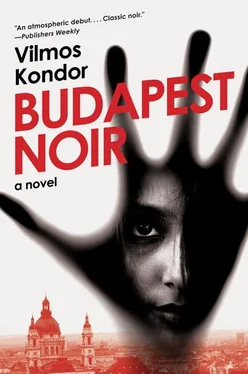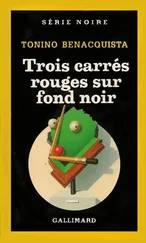“So what do you want to know,” said Gellért, leaning back in his chair.
“You still owe me the story of what happened to Róna,” Gordon replied.
The detective cast Gordon a look of surprise. “Róna? You want to talk to me about Róna?”
“Of course. I need to hand in the article.”
“Well,” said Gellért, lighting up a thin cigar, “I’m unable to tell you much, really. The court proceedings aren’t over yet, so officially I can’t even talk about the case.”
“Then unofficially.”
The detective raised his eyebrows. “Naturally enough,” he began, “Róna was not bribed. It’s just that in the course of another investigation, he’d gotten himself neck-deep in something he shouldn’t have.”
“Just what that was, you can’t say.”
Gellért nodded. “He’ll be acquitted, but since he got the detective corps into a sticky situation, he’ll be transferred. He won’t lose his job, but for a while he’ll have to investigate railway thefts.”
“This doesn’t have the makings of an article,” Gordon observed.
“I told you from the start not to bother with it. Not that it did any good.”
Gordon did not reply. The waiter arrived with the soup and the beef paprikash. Over lunch they stuck to neutral topics—the Spanish Civil War, Mussolini, and the Belgian king’s decision to build up his army because of the growing threat from Germany.
On finishing their meal, they both lit cigarettes. Gordon waved for the waiter and then paid the bill, try as Gellért did to protest. “I owe you for the lift you gave me the other day,” said Gordon.
“You’re not going to ask me about the dead girl?” Gellért blurted out.
“No,” Gordon replied. “I already know everything.”
“Everything?”
“Everything,” he said with a nod. “Well, there’s one little thing I don’t know.”
“What would that be?”
“Did you not want to tell Szőllősy’s wife that her daughter was dead, or did you not dare to?”
Gellért scrutinized Gordon’s face from behind the smoke of his cigar. “Does it matter?” he finally asked.
“Not so much anymore.”
“I didn’t dare to and I didn’t want to, either,” Gellért admitted. “I’m getting old. I have two years to go before retirement. I was looking for an opportunity to tell her, but . . .”
“I can also tell you’re getting older,” said Gordon.
“How’s that?”
“The other day you left your desk drawer open. Remember? I’d dropped by to see you at headquarters, and while waiting in your office, I noticed that you’d left one of the drawers open. You’ve never done that before.”
“I’ll ask my doctor to write me a prescription for forgetfulness,” replied Gellért.
“That wouldn’t hurt. The only reason I even mention it now is because what happens if an unauthorized individual goes into your office and sees an open drawer?”
“You’re right,” said the detective, tapping his cigar against the ashtray. “These unauthorized individuals can’t be trusted.” After a pause, he said, “Say, what’s up in the world of boxing?”
“Harangi is still in America as a member of the European team,” Gordon replied. They stood up and went toward the door. The waiter helped them get their jackets on. They stepped outside; the rain had stopped.
“I hope he wins,” said Gellért.
“Me, too. From what I’ve heard, he’s been boxing like a real champ.”
“And when’s the next match you’re going to?”
“Tonight,” said Gordon.
“Who’s fighting?”
“It doesn’t matter,” said Gordon with a dismissive wave of the hand. “Two brutes are going to knock each other’s brains out.”
“Well, then . . .” said Gellért, turning to Gordon.
“Thanks,” said Gordon, extending his hand.
The detective nodded, then turned to head back to the headquarters. Gordon walked back to Calvin Square and boarded a tram.
He pounded on the door in vain. He looked in the window, too, but on peering between the narrow slit in the curtains Gordon saw no movement inside. He heard steps in the stairwell. He turned and saw the super.
“Not so loud, sir, I beg you,” said the man, out of breath. “You’ll rouse the whole building.”
“At two in the afternoon? Who am I going to wake up at this hour?”
“Please, sir, this is a decent building.” Gesturing toward the door, he added, “Even despite this. Folks here don’t like an uproar. Besides, there’s no point pounding at this door.”
“Don’t you know where the young lady is?”
The man knit his brows at the word lady . “She left this morning.”
“Where to?”
“I really don’t know—but not to the market, that’s for sure. She had suitcases with her.”
“You mean she moved?”
“The young lady isn’t in the habit of notifying me what she does, when, and with whom,” he said sarcastically.
“But you saw her when she left, didn’t you?”
“Yes,” said the super with a nod. “She said ‘Good day,’ and I replied ‘Good day.’ She put her bags into a taxi that was waiting out front, and they drove away. That’s why I’m telling you not to pound on the door. There’s no one in the flat. And now if you’ll excuse me, sir, I must be going.”
Before boarding a tram at Apponyi Square, Gordon stopped at Liberty Square to withdraw two hundred pengős from a branch of Downtown Savings Bank. He didn’t keep his savings for this kind of thing, but he didn’t have a heavy heart taking out a sizable sum now. Then he got on the tram. Slowly it left behind the elegant buildings of downtown, and on Üllői Street—that busy road that crossed the Grand Boulevard and continued southeast into the dusty reaches of outer Pest—the tram clattered by ever more run-down, grayer buildings. And then came Orczy Park, from where Gordon could already make out, off in the distance, the moldering wooden barracks that comprised the Mária Valéria Colony—in a word, the slum. At Ecseri Road he got off the tram, took a deep breath, and headed along the muddy dirt road between the barracks, which would no longer have been suitable for either the soldiers or the POWs who had once been housed there. The farther in Gordon went, the more this sea of mud took on a different look. Some people had built adobe additions onto the barracks, whereas others had constructed brick outbuildings, resulting in an eerie labyrinth of sorts. After a while Gordon didn’t even know if he was sliding along an actual road or, rather, an utterly unofficial passageway between two structures. His nostrils were filled with a suffocating smoke. Few people here could afford wood, so more than a few heated their homes by burning old clothes and shoes. While the smell of the smoke did quell the stink of poverty, it could not hide the sorry spectacle that was this slum. Grimy-looking children were frolicking about in the mud, talking and shouting in a language Gordon barely understood. They chased each other about, most of them in bare feet, howling and hooting away. Behind some windows, oil lamps flickered; behind most, darkness reigned. In a yard, two old peasants, a man and a woman, were busy dragging into their shanty a heap of brush they’d presumably lugged back from nearby People’s Park. These two people, it seemed, had done everything they could to make their home look somewhat presentable. The end result was at once pathetic and touching. Water was dripping through their patchy roof; a lace embroidery served as a makeshift curtain in their window; and a cracked vase in the window held a wilted flower. Gordon stepped over to the couple and spoke.
“Good day.”
The old man slowly stood up straight. “G’day.”
Читать дальше
Конец ознакомительного отрывка
Купить книгу












